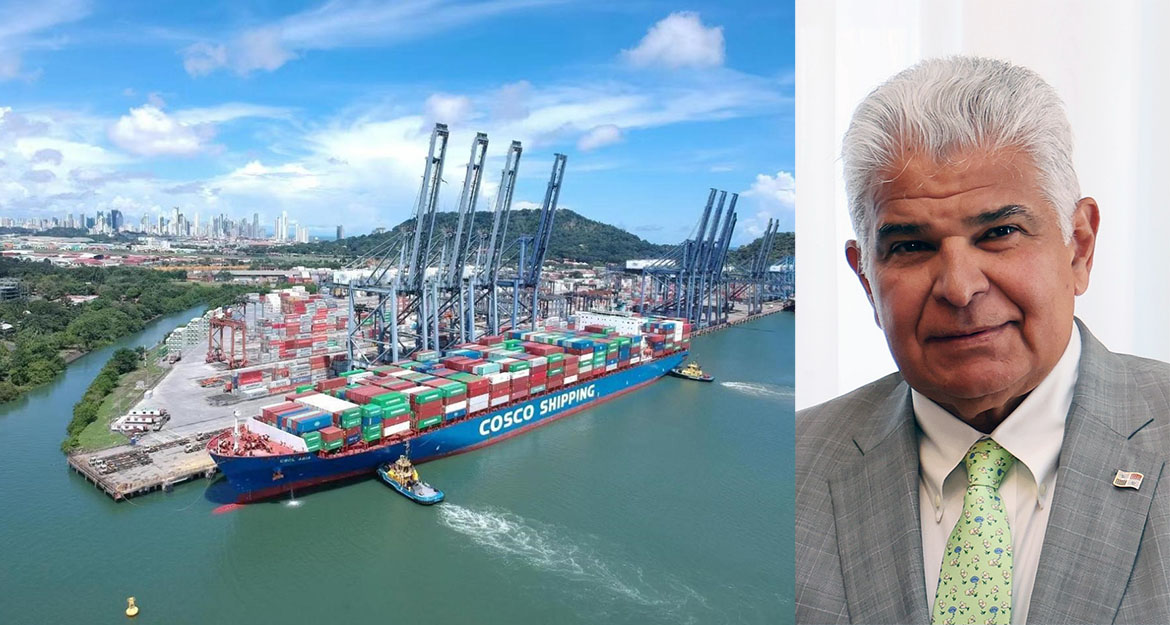In a resolute statement against the next U.S. President, Donald Trump, Panamanian President José Raúl Mulino declared that ”every square meter of the Panama Canal and its adjoining zone is Panama’s and will remain so.”
Panama is a country of just 4 million people. Still, its canal linking the Atlantic and Pacific oceans makes it one of the world’s busiest trade arteries and is strategically important to Washington and Beijing.
The statement follows Donald Trump’s assertion that the U.S. could demand the return of the Panama Canal if Panama does not lower the transit fees for American ships.
Trump’s comments via his Truth Social platform have stirred a significant reaction in Panama and internationally. He criticized the fees charged by the Panama Canal Authority, calling them ”ridiculous” and hinting at the possibility of reclaiming the canal, a strategic asset transferred to Panamanian control in 1999 under the Torrijos-Carter Treaties.
President Mulino’s response was swift and unequivocal. He emphasized Panama’s sovereignty over the canal and rejected Trump’s claims about unfair pricing. ”The canal is on Panamanian land and will always be Panamanian,” he affirmed, echoing national sentiments and among international observers who see the canal as a symbol of Panamanian independence.
Mulino: ”The canal is on Panamanian land and will always be Panamanian.”
The Panama Canal’s historical context cannot be overstated. Built by the U.S. at the turn of the 20th century, its transfer to Panama was a landmark event, symbolizing a shift from colonial control to sovereign management. The canal serves as a critical shipping route and an emblem of national pride for Panama.
Recent developments have seen international reactions. Analysts from various news outlets have pointed out that while Trump’s comments might resonate with his base, they largely ignore the legal and diplomatic frameworks established over decades.
Furthermore, the Panama Canal Authority’s director, Ricaurte Vásquez, has previously stated to the Financial Times the importance of keeping the canal relevant as a transit route for global trade, indicating careful pricing management to maintain its international role.
President Mulino, sworn in recently, has promised to tackle immigration through the Darien Gap, a key part of his agenda alongside managing the canal’s operations. His administration also grapples with a fiscal crunch and public debt inherited from previous governments.
While Trump’s presidency is set to begin in January 2025, the implications of his rhetoric on U.S.-Panama relations could be significant. Analysts suggest that while the U.S. might leverage economic or diplomatic measures, the outright reclamation of the canal is seen as an unlikely scenario due to established treaties and international law.
Panama stands firm on its sovereignty. President Mulino’s recent statements serve as a clear message to both domestic and international audiences about the canal’s status.
Panama Geopolitically Strengthened by The Belt and Road
Panama is reaping tangible benefits from its cooperation with China under the Belt and Road Initiative (BRI), positioning itself as a hub for global trade in the Americas. In November 2017, Panama became the first Latin American country to endorse BRI officially.
As the first country in Latin America and the Caribbean to sign a memorandum of understanding with China on BRI cooperation, Panama aims to align this initiative with its National Logistics Strategy 2030.
This collaboration has notably improved the country’s logistical capabilities, leveraging its strategic position with the Panama Canal at its core.
Railways to neighboring countries are planned through new BRI cooperations. Thus, BRI countries can help each other and build prosperity and strength.
Eddie Tapiero, a noted Panamanian economist, highlighted Panama’s natural advantages as an international shipping centre, stating:
”Panama will leverage its geographical advantage to deepen Latin America-China cooperation.”
The BRI has facilitated new infrastructure projects, including ports and logistics hubs, significantly boosting global trade routes.
Former minister of Housing and Territorial Planning in Panama, Rogelio Paredes, praised the initiative, noting:
”Belt and Road cooperation has brought tangible benefits to Panama.”
Recent developments include the establishment of overseas warehouses by Chinese companies like China COSCO Shipping, which have streamlined logistics, reduced transportation costs, and stabilized supply chains in Latin America.
This partnership strengthens Panama’s role in global trade and deepens economic ties with China, promising further regional growth and development. Through new BRI projects, railways to neighbouring countries are planned. BRI countries can thus help each other and build prosperity and strength.
By T. Sassersson
Sources
- TeleSUR: Channel is ‘Panama’s and Will Remain So’ Says President Mulino After Trump’s Threat
- Belt and Road News Network: Belt and Road cooperation brings tangible benefits to Panama
- China Daily: The canal will remain ’in Panamanian hands’: Mulino
- Atlantic Council: Belt and Road in Latin America: A regional game changer?
- Forbes: China’s Belt And Road Initiative Aims For Long-Term Global Leadership
- Associated Press: Panama president cheers China’s ‘Belt and Road’ initiative


